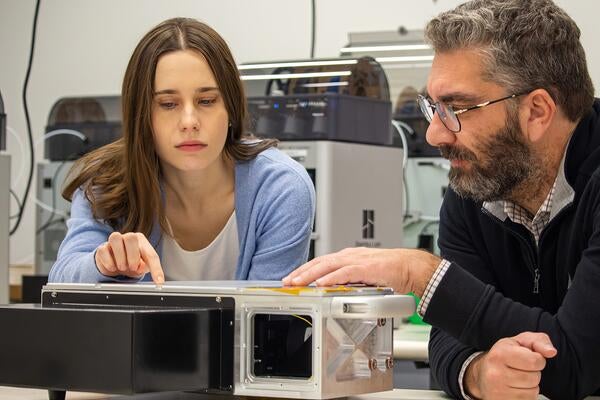
A role model for math — and life
Anita Layton is building math models to get lifesaving treatments to people faster

Anita Layton is building math models to get lifesaving treatments to people faster
By University RelationsThis story was originally published in the Fall 2022 Waterloo Magazine.
If you ask Anita Layton what it’s like to be a scientist leading the world in a discipline that promises to revolutionize medicine, she can, like a true mathematician, bring her extraordinary career down to a fundamental principle: “I want to solve challenging and important problems. What is most important in life? Our health,” said Layton, the Canada 150 Research Chair in Mathematical Biology and Medicine.
Layton, a leader in a field attracting the brightest mathematicians and clinicians in the world, is using math models — much like scientists have used microscopes for hundreds of years — to reveal otherwise invisible processes in the body.
The research, which involves solving some of the most complex computational problems in mathematics, helps bring lifesaving drugs to people more quickly.
"What is most important in life? Our health."
Layton’s impact is seen in the vast range of researchers who cite her work, which includes biologists, biomedical engineers, mechanical engineers, civil engineers and other mathematicians. It has real-world impact by giving solutions to physicians trying to find better treatments for their patients.
Layton has made discoveries about diabetes drugs that are being leveraged by Pfizer and Brigham and Women's Hospital (Harvard Medical School) to treat heart failure. She also builds math models to find sex differences in our metabolism and developed the first computational models for blood pressure regulation that consider differences between men and women. Layton’s landmark contribution has cast doubt on the “one size fits all” approach to hypertension treatment and highlights the gender bias in medical research that historically studies men or male animals.
Layton’s discovery has the potential to affect millions of people with hypertension because, even though women are more likely to be treated and take their medication, only 45 per cent of treated women achieve blood-pressure control, compared to 51 per cent of treated men.
Siv Sivaloganathan, former chair of the Department of Applied Mathematics at Waterloo, helped recruit Layton from Duke University in 2018. He said her accomplishments have shone a spotlight on the University and the potential of using math to save lives.
“Anita is a powerhouse … She has really added much more value than we could have ever expected,” Sivaloganathan said.
Her contributions have been widely recognized across Canada and the world, with numerous awards and honours, including being named a fellow of the Royal Society of Canada (RSC) in 2022, the highest honour an individual can achieve in the arts, social sciences and sciences. More recently, she was presented with the John L. Synge Award in 2023, recognizing her outstanding research in mathematical sciences. She was also awarded the 2023 Federation of Chinese Canadian Professionals (FCCP) Education Foundation Award of Merit.
Previously, Layton was named one of Canada’s Most Powerful Women of 2021 and awarded the prestigious Krieger-Nelson Prize by the Canadian Mathematics Society for her exceptional contributions to mathematical research. She is also a Fellow of the Association for Women in Mathematics and the Canadian Mathematical Society.
Layton explains that testing new drugs is expensive — a single trial for a drug can cost upwards of $3 billion. And at 5 to10 years from start to approval, developing lifesaving treatments happen far too slowly for many people who are living with illnesses like cancer, diabetes or Alzheimer’s disease.
But now, math models are helping medical researchers simulate the effectiveness of potential new treatments before they are tested on patients in the final phase of clinical trials. The computer simulations can also determine optimal doses and predict whether patients will experience side effects.
She explains that if there are 20 drug candidates for Alzheimer’s disease, for example, it is much cheaper and safer to run computer simulations for all 20 drugs, identify the top performers, and only do clinical trials on the drugs that have the best chance of helping patients.
These advances also save more patients from the crushing blow of finding out the new drug trial they are part of has been cancelled because it’s not working or is causing harmful side effects.
Layton knows too well the devastation of finding out that a drug trial has been cancelled for a loved one facing a terminal illness. Her late husband, Harold Layton, participated in a drug trial after being diagnosed with early-onset Alzheimer’s disease.
She remembers the week Harold’s neurologist emailed her to report that the clinical drug trial he had been part of was cancelled because the treatment was actually making people worse.
Layton had known the odds going in — during the past 20 years, there have been more than 160 failed attempts to develop a drug to treat Alzheimer’s disease — but the news about Harold’s drug trial still felt like a punch in the stomach.
“Some people cling to hope,” she said. “I find hope cruel. In most cases, it does not pan out and then you have to deal with collapse.”
While Layton’s research directly addresses gender biases in medical research, she is also a leader at Waterloo and beyond who fights to remove systemic barriers in academia and industry. Layton was the inaugural chair of the University’s Research Equity, Diversity and Inclusion Council, a group that supports and promotes the careers of members of equity-seeking groups. Her own research group is gender balanced, with most members being from racialized groups, which is almost unique in mathematics.
When Rico Mariani (BMath ’88), a veteran of the tech industry, wanted to create a new scholarship for Black and Indigenous students in Waterloo’s Cheriton School of Computer Science, things moved slowly until Layton caught wind of the initiative and began to push things forward within days.
“When you are building something new, even one missing brick can make the whole thing fall apart. On the other hand, anyone with even one brick can make things happen,” said Mariani.
 Layton with Rico Mariani (BMath ’88)
Layton with Rico Mariani (BMath ’88)
“When I was trying to create a scholarship for Black and Indigenous students, Anita brought truckloads of bricks.”
Layton’s vision is nothing less than a community that includes the talents and voices of all, with experts across disciplines who conduct biomedical research that moves beyond the reactive, one-size-fits-all approach, to one that is more personalized, preventative and precise.
“We can imagine a world in which healthcare is better and more equitable,” Layton said. “That world can only be reached if biomedical, clinical and quantitative scientists all work together.”

Read more
Shu (Joy) Jiang is designing a modelling tool to help patients better understand their breast cancer risk

A car’s exhaust pipe emits black carbon. This sooty form of pollution alters the “light environment” beneath the snow, affecting plant growth. (Kmatija/Getty Images)
Read more
Research into light and snow interactions provides new insights into how pollution can affect vegetation growth and impact ecosystems

Read more
Phantom Photonics’ quantum remote sensing technology offers precision for industries operating in extreme environments
The University of Waterloo acknowledges that much of our work takes place on the traditional territory of the Neutral, Anishinaabeg, and Haudenosaunee peoples. Our main campus is situated on the Haldimand Tract, the land granted to the Six Nations that includes six miles on each side of the Grand River. Our active work toward reconciliation takes place across our campuses through research, learning, teaching, and community building, and is co-ordinated within the Office of Indigenous Relations.